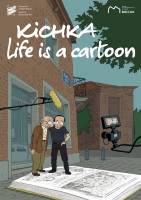Kichka: Life Is a Cartoon Filming Locations
Kichka: Life Is a Cartoon Filming Locations
Belgium, a country in Western Europe, is known for medieval towns, Renaissance architecture and as headquarters of the European Union and NATO. The country has distinctive regions including Dutch-speaking Flanders to the north, French-speaking Wallonia to the south and a German-speaking community to the east. The bilingual capital, Brussels, has ornate guildhalls at Grand-Place and elegant art-nouveau buildings.
France, in Western Europe, encompasses medieval cities, alpine villages and Mediterranean beaches. Paris, its capital, is famed for its fashion houses, classical art museums including the Louvre and monuments like the Eiffel Tower. The country is also renowned for its wines and sophisticated cuisine. Lascaux’s ancient cave drawings, Lyon’s Roman theater and the vast Palace of Versailles attest to its rich history.
Kichka: Life Is a Cartoon (2018)
Kichka: Life Is a Cartoon is a film about the relationship between a son and his father, the latter a victim of and witness to the Holocaust. It shows that such a trauma determines the psychology of all the members of a family. In spite of, or perhaps indeed due to the distressing theme, the film is full of lightness, affection and hope. Henri Kichka was born in Brussels in 1926. In 1942 he was arrested by the Gestapo, together with his parents and two sisters. He spent three years imprisoned in various concentration camps. His mother and sisters were murdered. His father died on the way to Buchenwald, from which Henri was liberated in 1945. After the war, Henri Kichka returned to Brussels and married. He had four children: Hannah, Michel, Iréne and Charly. His son Michel Kichka was born in Seraing/ Liège in 1954. At the age of 20, he emigrated to Israel, started his family and embarked on a career as cartoonist. In 2012 he published the graphic novel Second Generation, devoted to Michel's younger brother, who committed suicide. The main theme, however, is the relationship between the son and the father, who had been a victim of and witness to the Holocaust. The book shows that such a trauma determines the psychology of all the members of a family. The Center for Persecuted Arts in Solingen and the MOCAK Museum of Contemporary Art in Krakow have presented Michel Kichka's drawings in several exhibitions, including in the German Bundestag in Berlin (2015). Now both museums have worked together on the production of the present documentary about the Kichkas, based on the graphic novel Second Generation. In one of the most intense moments of the film, father and son visit the house where Henri Kichka was arrested by the Gestapo in 1942. The 63-year-old Michel has never been there before, the 91-year-old Henri avoids this place which for him is filled with the worst memories of the moment that was to change his life horrifically and irrevocably. This scene is featured on the poster of the film. Kichka reveals the dramatic potential of the cartoon as a form of art, and it is only through art that father and son are finally able to communicate. Indeed, the film transcends the confines of a graphic novel, illustrating how both Kichkas recapitulate the family history, talking about the life of the father as a witness; finally, they have overcome the speechlessness. Michel Kichka discusses the responsibilities of the second generation with Beate and Serge Klarsfeld. In conversation with Jean 'Plantu' Plantureux, the cartoonist of Le Monde and the founder of Cartooning for Peace, the film departs from the subject of the Shoah, broadening out into political caricature and comic art per se.
